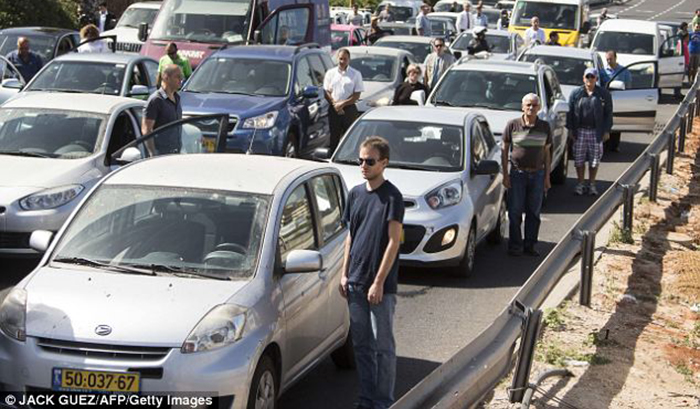Dateline Jerusalem — Exactly one week after Israelis mourned the six million Jews murdered in the Holocaust, we mourn those who died defending and protecting Israel from its enemies and victims of terrorism on Yom HaZikaron, Israel’s Memorial Day, also known as Remembrance Day. Like last week, the nation comes to a complete standstill while sirens wail throughout the country, memorial candles are lit, drivers exit their vehicles on roads and freeways, train passengers disembark on train platforms. The entire country stands at attention, in silence, with bowed heads. Then the country goes directly from sadness on Yom HaZikaron to gladness on Yom HaAtzmaut, Israel’s Independence Day. Happy 67th birthday, State of Israel. The State of Israel may be young, but the Land of Israel has been the home to Jews continuously and without interruption for over 3,000 years.
For Remembrance Day, the Israeli government lays flags with black ribbons on 23,000 graves. Government officials and bereaved families attend ceremonies at the Kotel, (the Western Wall or Wailing Wall), the only remnant of the Holy Temple in Jerusalem, and at military cemeteries. Just in the past year, 116 soldiers and civilians were victims of terror and war. There are memorial services throughout the country. Just about every city and town has parks with memorial walls and statues engraved with the names of its lost heroes and victims of terror. Because both boys and girls are drafted into the Israeli Army after high school, soldiers are given the utmost respect by their fellow Israelis, unlike the situation in America. Both my parents served in the U.S. military. It saddens me when I see how terribly veterans are treated in the U.S, nowadays. In Israel, it is said that there is not one family who has not experienced a loss or known a family who has suffered a loss due to war or terrorism. Nearly everyone I know has a loved one serving in the military or doing reserve duty.
For the last 67 years, Israel has been in a constant battle for its existence. Perhaps that is why Israelis are not as apathetic as Americans when it comes to appreciating their freedoms. We are constantly reminded of how fragile are freedom and democracy, how special it is to be born or to live in a country where freedom and democracy exist. It really hit home for me last summer during the Gaza War when I had only one minute to run to shelter while rockets, missiles and mortars were launched at Israel by Hamas. Yet I often feel safer in Israel than I did living in the States.
Celebrations for Independence Day are similar to those in the States. There are barbecues, picnics, fireworks, family gatherings, aerial shows, concerts in the parks, and the great weather means the beaches are crowded. Other than a few homes and businesses with flags and small town parades in the U.S., there doesn’t seem to be the excitement, the fervor of an Israeli Independence Day. In Israel, everyone seems to have a flag hanging from their apartment windows, balconies or flying in the breeze from their vehicles. It is exciting to see the blue six-sided Star of David, sitting between two thick blue stripes on the pristine white flag background, just about everywhere one looks. Buildings and high-rise apartments are draped with gigantic sized Israeli flags hanging down the sides of the building from the roof to the sidewalk. Streamers, banners and little flags criss-cross every intersection. Even some roads are cordoned off for block-parties and so Israelis can dance in the streets. I have small flags flying from windows, large flags hanging from the wrought iron railings of my apartment. I also have Israeli flag toothpicks.
L’hitraot. Shachar

